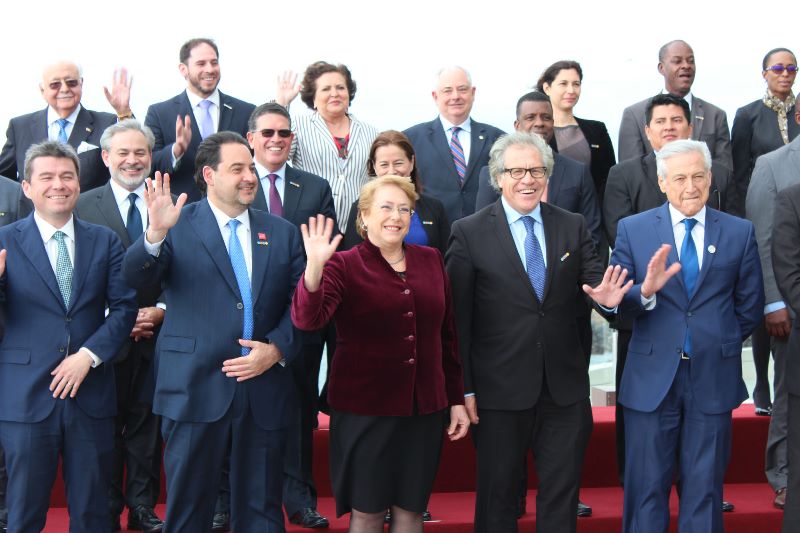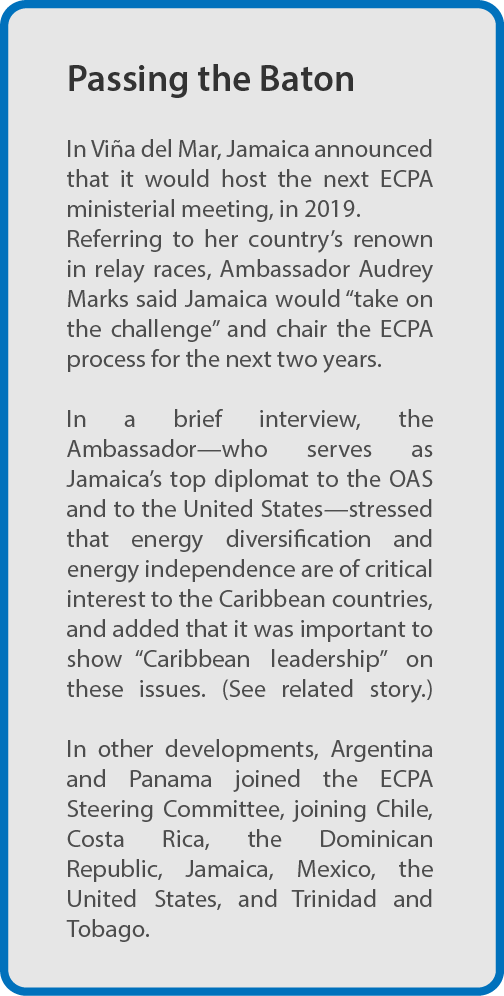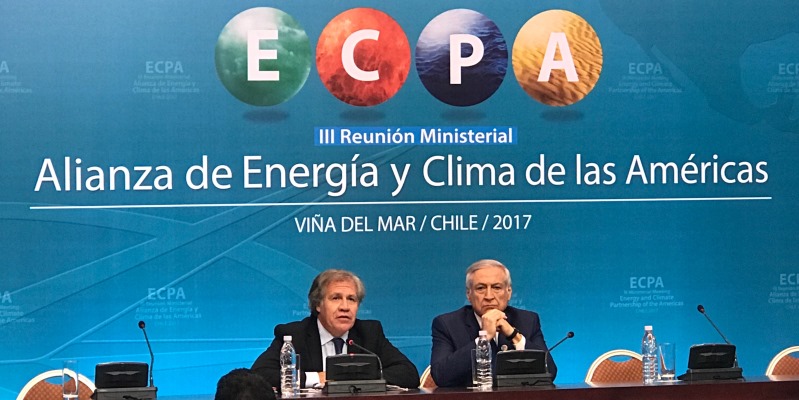
VIÑA DEL MAR, Chile—Meeting here to discuss the “Energy Transition in the Americas,” energy ministers and other high-level officials from 24 countries in the region reaffirmed that they share “a common path” toward cleaner energy, as Chilean President Michelle Bachelet put it.

That message was always going to be central to the Third Ministerial Meeting of the Energy and Climate Partnership of the Americas (ECPA), which took place September 7-8 in this coastal Chilean city. But the subject took on renewed urgency against the backdrop of events unfolding thousands of miles to the north, where Hurricane Irma was churning across several Caribbean islands, causing catastrophic damage. In fact, ministers from two countries—Antigua and Barbuda and Saint Kitts and Nevis—were unable to travel to Chile because they had to attend to the emergency at home.
 In her remarks to open the ministerial meeting, President Bachelet expressed Chile’s solidarity with all those who had already suffered or would soon suffer Irma’s devastation, as well as those who had recently felt the impacts of Hurricane Harvey. “We are dismayed to see that events of this nature are growing more and more powerful, with increasingly destructive effects,” she said, adding that this served as another reminder of the need to act.
In her remarks to open the ministerial meeting, President Bachelet expressed Chile’s solidarity with all those who had already suffered or would soon suffer Irma’s devastation, as well as those who had recently felt the impacts of Hurricane Harvey. “We are dismayed to see that events of this nature are growing more and more powerful, with increasingly destructive effects,” she said, adding that this served as another reminder of the need to act.
“The energy transition is one of our most urgent tasks,” Bachelet told the ministers. “There is no time to lose if we are to reduce the most polluting emissions and prevent climate change from getting worse.”
The Secretary General of the Organization of American States (OAS), Luis Almagro, talked about the unmatched potential of the Americas, with its “vast energy wealth.” In addition to fossil fuels—the region has one third of the world’s proven oil reserves, and 15 countries produce natural gas—the countries of the Americas have a wide array of renewable resources, including hydro, solar, wind, and geothermal power.
“Sixty percent of the region’s electricity is produced with renewable energy, the highest rate in the world,” Almagro said.
While the region is close to providing universal access to energy, the Secretary General said, an estimated 30 million people in the Americas still have no access to electric power. “It is a paradox that in a region with such a diversity of renewable and conventional energy resources, there are still 30 million people immersed in energy poverty,” he added.
“The lack of access to electricity reduces the possibility for a child to do well in school, or for a young person to pursue a university degree or learn a trade. Without electricity, quality medical services cannot be provided. Without public lighting, it is impossible to build safe communities,” Almagro explained.
The ministerial meeting provided an opportunity to “share experiences, exchange technologies, facilitate investment, and maximize comparative advantages,” the Secretary General said. “Since ECPA was created in 2009, almost all the countries in the region have participated in a fluid dialogue around renewable energy. ECPA has become a facilitator of dialogue for governments and business groups that propose to open new energy markets that generate revenue and improve people’s quality of life,” he added.

In addition to the country delegations, the meeting included the active participation of the private sector, through the Americas Business Dialogue. It also included representatives of several multilateral development banks and other international agencies that support renewable energy and in some cases provided financial support to make the meeting possible.

Chilean Foreign Minister Heraldo Muñoz also participated in the meeting, showing that Chile’s support for the energy transition is government-wide. At a press conference before the ministerial meeting, he emphasized that investment in energy is now outperforming investment in mining in Chile, and stressed that the country must continue to develop clean, efficient energy to combat the challenges of the future. “Climate change is a reality that is here to stay,” Muñoz told reporters.
In his opening remarks to the ministers, Chilean Energy Minister Andrés Rebolledo detailed some of the progress made since Chile took on the chairmanship of ECPA in 2015, and underscored that this has been “an effort of unity and commitment.” The ECPA Steering Committee has held 27 meetings in the last two years, four of them face-to-face, and ECPA has held three hemisphere-wide meetings—in Santiago, Miami, and Port of Spain, he said.
“This active participation speaks to a real need and a shared willingness by our countries to work in an integrated way” to make the transition to clean energy, Rebolledo said. Noting that this is a worldwide trend, he stressed the importance of finding the best solutions for the region, taking into account the countries’ diversity and range of resources.

The countries meeting in Viña del Mar adopted a detailed Action Plan, which lays out specific initiatives they will take in the next two years—either individually or in collaboration with other countries—to further their goals. The initiatives are organized around the seven pillars of ECPA: energy efficiency, renewable energy, efficient use of fossil fuels, energy infrastructure, energy poverty, regional energy integration, and energy research and innovation.
While every country has its own responsibilities on the energy front, multilateral cooperation can strengthen individual efforts and advance shared goals, President Bachelet said: “What are we telling the rest of the world? That we wish to commit to a common path. That in our countries, from Canada to the extreme south, we are making a commitment to transition toward cleaner, more modern, and more accessible energy sources for all.”
 View Map
View Map